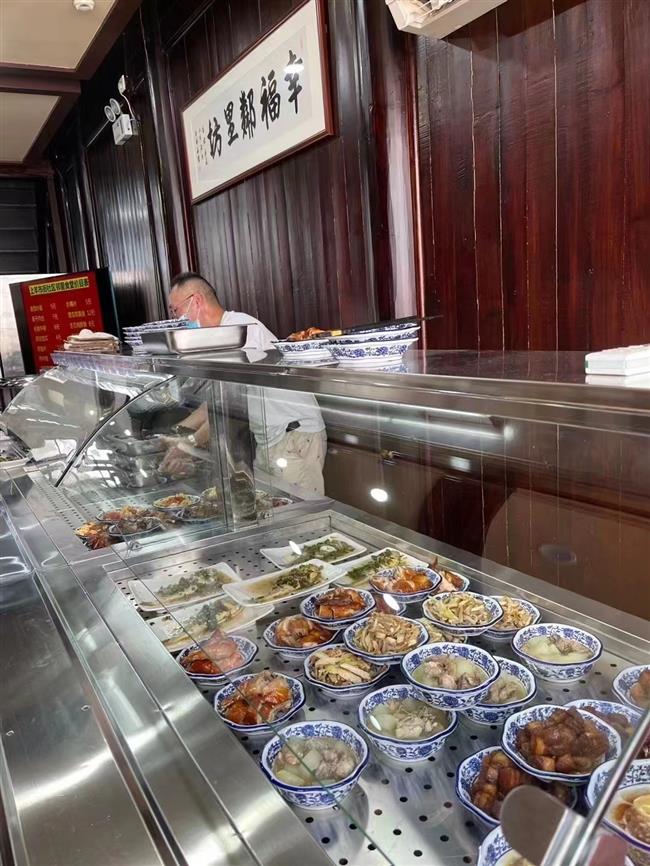Smart machines save seniors the trouble of cooking
From now on senior residents living in the Shangyang Shijie Residential Community are saved the trouble of cooking by themselves, as the community has opened a cafeteria that uses smart machines to make food.
Around 34 percent of the 9,000 residents are above 60 and some of them are empty nesters, or old people living alone.
In a bid to make their life easier, the local government cooperated with Hangzhou technology and service companies to open the cafeteria, which offers 12 choices each meal time.
Shangyang Shijie boasts a batch of old, wooden-structure buildings under protection.
According to urban management regulations, this area is not permitted to set up restaurants, which means the cafeteria cannot cook with fire.
"Formerly, we cooperated with a food delivery company, sending food to the residents. However, the seniors require a dine-in cafeteria more than eating alone at home," said Jin Hui, vice director of Ziyang Subdistrict, Shangcheng District.
To solve the problem, the residential committee purchased two machines from Hangzhou Ziguang Weilai Co.
Cafeteria staff put food into the machine and choose a program on the control panel, and then mouth-watering cuisine is completed in just a few minutes.

The smart machines in service at Shangyang Shijie cafeteria can do the cooking without fire.
"We were inspired by the Beijing 2022 Winter Olympic Games, as the video of the service robot in the Olympic Village went viral on social media. We figured we would set up a cafeteria with smart technology," Jin added.
The machine can cook most of the dishes that people normally make themselves. Cafeteria workers adjust the programs to suit the tastes of the elderly.
"The taste is the same as hand-cooked dish," said 83-year-old Chen Jinhua. "But the wax gourd is a bit chewy for me as my teeth are not so good."
Each machine is priced at 60,000 yuan (US$8,874) and can be used for years. The cost is much lower than recruiting chefs, which in return results in 20 percent cheaper prices than other cafeterias.
"I live alone. Going out to buy food from the nearby wet market is difficult for me in such scorching days," said 76-year-old Li Dabo. "The cafeteria is my best choice."
The machines represent the integration of several advanced technologies, such as artificial intelligence, sensors, chips and machinery engineering in Hangzhou.
They may be a part of the solution for the city's aging society.

A cafeteria recently opened in Shangyang Shijie Residential Community uses smart cooking machines to make common dishes.
The Shangyang Shijie Residential Community is the epitome of Hangzhou's aging society.
Built in the 1990s, the community has problems including limited parking lots, a lack of green space, waterlogging and poor facilities.
Last year, after a facelift with more emphasis on green space, the old residential community was reinvigorated.
Elevators have been installed in old buildings, which are helpful for residents, especially the elderly who struggle to get up and down stairs on a daily basis.
Local government offers subsidies to residents and cooperates with several elevator manufacturing companies to set up lifts in multi-story old buildings.
Every household on the third floor and above pays a proportionate installation fee and shares yearly maintenance costs.
The community also carves out space to set up electric moped battery charging piles.
For many years, this old community was vulnerable to waterlogging caused by outdated facilities, which was considered to be an eyesore.
Now, the upgrading of underground wires and tubes make neighborhoods, streets and greenery better store rainwater.
China's first residential committee was in Shangyang Shijie. After the founding of the People's Republic of China, the government was looking for a new, better neighborhood organization system, and thus the residential committee began here.
The China Community Construction Exhibition Center, in a revamped traditional mansion, is the first community museum of its kind in China. Visitors can study the history of China's urban residential committees, a basic unit of neighborhood organization.
















